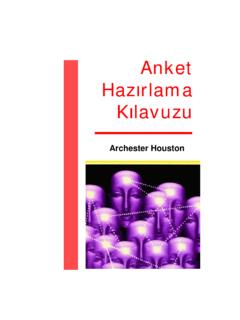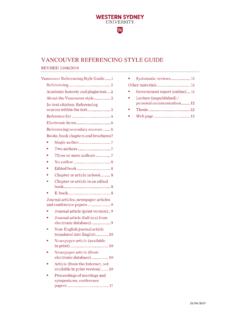Transcription of THE HISTORICAL TEXT AS LITERARY ARTIFACT - Hacettepe
1 80 HAYDEN WHITE. pp 158-238, though they should be taken as little more than labels of the complex charac- terizations he offers 39 Marx himself, of course, refers to the events leading up to Louis Napoleon's coup as a "farce" and contrasts it to the "tragedy" of the Revolution of 1789 The tone is ironic throughout, but the point of view is anything but that On the contrary, Marx has by this point in his career fully worked out the explanatory theories by which to disclose the true structure of the events under consideration They are given their meaning by being set within the larger framework of the whole history of the bourgeoisie, which, in the Communist Manifesto, he characterizes as a "Promethean" tragic hero of the drama of history 40 Karl Mannheim, "Conservative Thought," in Essays in Sociology and Social Psy- chology, ed Paul Kecskemeti (New York, 1953), pp 74-164 See also Ideology and Utopia- An Introduction to the Sociology of Knowledge, trans Louis Wirth and Edward Shils (New York, 1946), pp 180-82, 206-15.
2 41 See Thomas S Kuhn, The Structure of Scientific Revolutions (Chicago, 1962), pp 18-20 and chap 13. 42 See Kenneth Burke, A Grammar of Motives (Berkeley and Los Angeles, 1969), app D, "Four Master Tropes," pp 503-17 The whole question of the nature of the tropes is difficult to deal with, and I must confess my hesitancy in suggesting that they are the key to the understanding of the problem of interpretation in such proto-scientific fields as history I am THE HISTORICAL TEXT. prompted to persevere in this belief, however, not only by Burke's work, but also by the exam- ple of Vico In The New Science, Vico suggests (although he does not make the point explicitly) AS LITERARY ARTIFACT . that the forms of consciousness of a given age in a culture's history correspond to the forms of consciousness given by language itself to human efforts to comprehend the world Thus the forms of science, art, religion, politics, etc , of the four ages of a culture's evolution (the ages of gods, heroes, men, and decline, or ncorso) correspond exactly to the four stages of consciousness reflected in the dominance of a given trope metaphor, metonymy, synedoche, and irony, in One of the ways that a scholarly field takes stock of itself is by consider- that order See The New Science, trans Thomas Goddard Bergin and Max Harold Fisch (Ithaca, ing its history.)
3 Yet it is difficult to get an objective history of a scholarly 1968), 400-410, pp 127-32, and 443-46, pp 147-50 See also the interesting correla- discipline, because if the historian is himself a practitioner of it, he is likely tions of mental disorders and linguistic habits made by Roman Jakobson, on the basis of the to be a devotee of one or another of its sects and hence biased; and if he is contrast between "metaphorical" and "metonymic" speech, in his Essais de linguisttque not a practitioner, he is unlikely to have the expertise necessary to distin- generate, trans Nicolas Ruwet (Paris, 1963), especially the essay "Le Langage commun des guish between the significant and the insignificant events of the field's hnguistes et des anthropologues," pp 25-67 Jakobson expands on these correlations, for pur- poses of LITERARY criticism, in "Linguistics and Poetics," in Style in Language, ed Thomas A development.
4 One might think that these difficulties would not arise in the Sebeok (New York and London, I960), pp 350-77 field of history itself, but they do and not only for the reasons mentioned 43 Burke, Grammar of Motives, pp 505-10 above. In order to write the history of any given scholarly discipline or even 44 See Michel Foucault, The Order of Things An Archaeology of the Human Sciences of a science, one must be prepared to ask questions about it of a sort that do (New York, 1970), pp 298-300 not have to be asked in the practice of it. One must try to get behind or 45 Burke, Grammar of Motives, pp 511-16 beneath the presuppositions which sustain a given type of inquiry and ask 46 Cf Vico on irony, in The New Science, par 408, p 131. the questions that can be begged in its practice in the interest of determin- ing why this type of inquiry has been designed to solve the problems it characteristically tries to solve.
5 This is what metahistory seeks to do. It ad- dresses itself to such questions as, What is the structure of a peculiarly his- toricalConsciousness? What is the epistemological status of HISTORICAL expla- nations, as compared with other kinds of explanations that might be offered to account for the materials with which historians ordinarily deal? What are the possible forms of HISTORICAL representation and what are their bases? What authority can HISTORICAL accounts claim as contributions to a secured knowledge of reality in general and to the human sciences in particular? Now, many of these questions have been dealt with quite competently 81. HAYDEN WHITE HISTORICAL TEXT AS LITERARY ARTIFACT 83. 82. over the last quarter-century by philosophers concerned to define history's therefore follows that the historian, like any writer of discursive prose, is to relationships to other disciplines, especially the physical and social sciences, be judged "by the truth of what he says, or by the adequacy of his verbal and by historians interested in assessing the success of their discipline in reproduction of his external model," whether that external model be the ac- mapping the past and determining the relationship of that past to the pres- tions of past men or the historian's own thought about such actions.
6 Ent. But there is one problem that neither philosophers nor historians have What Frye says is true enough as a statement of the ideal that has in- looked at very seriously and to which LITERARY theorists have given only pass- spired HISTORICAL writing since the time of the Greeks, but that ideal presup- ing attention. This question has to do with the status of the HISTORICAL nar- poses an opposition between myth and history that is as problematical as it is rative, considered purely as a verbal ARTIFACT purporting to be a model of venerable. It serves Frye's purposes very well, since it permits him to locate structures and processes long past and therefore not subject to either experi- the specifically "fictive" in the space between the two concepts of the mental or observational controls. This is not to say that historians and "mythic" and the " HISTORICAL .
7 " As readers of Frye's Anatomy of Criticism philosophers of history have failed to take notice of the essentially provi- will remember, Frye conceives fictions to consist in part of sublimates of ar- sional and contingent nature of HISTORICAL representations and of their sus- chetypal myth-structures. These structures have been displaced to the in- ceptibility to infinite revision in the light of new evidence or more sophisti- terior of verbal artifacts in such a way as to serve as their latent meanings. cated conceptualization of problems. One of the marks of a good profes- The fundamental meanings of all fictions, their thematic content, consist, in sional historian is the consistency with which he reminds his readers of the Frye's view, of the ' 'pre-generic plot-structures" or mythoi derived from the purely provisional nature of his characterizations of events, agents, and corpora of Classical and Judaeo-Christian religious literature.
8 According to agencies found in the always incomplete HISTORICAL record. Nor is it to say this theory, we understand why a particular story has "turned out" as it has that LITERARY theorists have never studied the structure of HISTORICAL narratives. when we have identified the archetypal myth, or pregeneric plot structure, But in general there has been a reluctance to consider HISTORICAL narratives as of which the story is an exemplification. And we see the "point" of a story what they most manifestly are: verbal fictions, the contents of which are as when we have identified its theme (Frye's translation of dianoia), which much invented as found'and the forms of which have more in common with makes of it a "parable or illustrative fable." "Every work of literature,". their counterparts in literature than they have with those in the sciences.
9 Frye insists, "has both a fictional and a thematic aspect," but as we move Now, it is obvious that this conflation of mythic and HISTORICAL con- from "fictional projection" toward the overt articulation of theme, the sciousness will offend some historians and disturb those LITERARY theorists writing tends to take on the aspect of "direct address, or straight discursive whose conception of literature presupposes a radical opposition of history to writing and cease[s] to be literature." And in Frye's view, as we have seen, fiction or of fact to fancy. As Northrop Frye has remarked, "In a sense the history (or at least "proper history") belongs to the category of "discursive HISTORICAL is the opposite of the mythical, and to tell the historian that what writing,'' so that when the fictional element or mythic plot structure is gives shape to his book is a myth would sound to him vaguely insulting.
10 " obviously present in it, it ceases to be history altogether and becomes a Yet Frye himself grants that "when a historian's scheme gets to a certain bastard genre, product of an unholy, though not unnatural, union between point of comprehensiveness it becomes mythical in shape, and so approaches history and poetry. the poetic in its structure." He even speaks of different kinds of HISTORICAL Yet, I would argue, histories gain part of their explanatory effect by myths: Romantic myths "based on a quest or pilgrimage to a City of God or their success in making stories out otmere chronicles; and stories in turn are classless society"; Comic "myths of progress through evolution or revolu- made out of chronicles by an operation which I have elsewhere called tion"; Tragic myths of "decline and fall, like the works of Gibbon and "emplotment.











